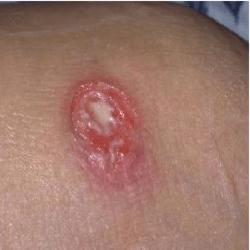5 Facts About Bed Sores You Need to Know

The sneaky thing about bed sores is that they often show up unsuspectingly on people who are already dealing with time-consuming and stressful illnesses themselves – afflictions which render them mostly immobile, like ALS, or affect blood circulation, like diabetes.
Know these 5 facts to be better prepared and equipped to handle potential bed sores (also known as pressure ulcers):
There Are 4 Stages Of A Bed Sore
The beginning of a bed sore looks as simple as a reddened or pink area of skin, or for people with darker skin, may not even be noticeable. This seemingly harmless change to the skin is a warning much to be heeded – physicians call it Stage 1.
In Stage 2 of a bed sore, the skin visibly breaks open and forms a tender and oftentimes painful ulcer. A crater in the flesh forms in Stage 3 where the pressure ulcer is expanding into deeper layers of tissue below the skin. And at stage 4, the breakdown has made its way to layers of muscle and eventually bone, putting you or your loved one at risk for infection or worse.
A Wound Care Specialist Is A Must
No matter what you research online or learn from a friend, a bed sore should be seen by a wound care specialist so they can diagnose the stage, strategize a bed sore treatment and prevention plan, and teach you or your caregiver the steps and practices you need to know to keep it in check.
How do you go about finding a wound care specialist? Call or visit your general practitioner to have a discussion about your pressure ulcer and to receive a medical order for a wound care specialist to evaluate your condition. Oftentimes, they will come to your home or are available in office. They offer education, supplies, and are required to check back in with the progress and prevention of the sore reaching further stages.
Repositioning Is Just As Important As Wound Dressings
“Pressure” is the key word in the term “pressure ulcer.” No matter how you bandage, treat and dress a bed sore, unless you are alleviating the pressure which is causing the skin and tissue breakdown, it will never heal.
Repositioning is as simple as propping the body slightly to one side or the other (typically with pillows) depending on where the bed sore is located. Experts recommend repositioning every two hours at a minimum to alleviate the pressure and weight bearing that occurs for someone who is sitting or lying down for an extended period of time. Don’t forget too that bed sores can occur in seemingly odd places like the bonier areas of the hands, elbows, shoulder blades, or even the heels!
Diet Modifications Can Help
Incorporating foods that facilitate healing and skin growth can absolutely benefit someone treating (or preventing) a bed sore. Foods rich in protein and vitamins A, C and E promote tissue healing – think oranges, avocadoes, sardines, broccoli, nuts and olives. Additionally, a diet rich in whole foods including dark leafy greens, fruits, veggies and whole grains, can help maintain a healthy weight, which is ideal for preventing bed sores, even in bed-limited people.
Being underweight can result in less muscle mass and fat that protects your tissue from bone. On the flipside, being overweight can increase the amount of pressure placed on certain points of the body. A balanced weight is key to preventing unnecessary pressure ulcers, and that happens with a thoughtful diet and routine activity.
Bed Sores Don’t Have to Prevent Activity
Is concern over a bed sore on the coxic or thigh preventing your from going out with your mobility aid? With proper dressing and attention, bed sores don’t have to hold you back. Encourage a discussion with your doctor and/or wound care specialist about staying active, even if it’s just for a few hours every other day.
Exercising, going out for a walk (or roll) in the sunshine, cooking, visiting with friends . . . all of these types of activities are vital to your continued mental and physical wellness. Not only does regular activity boost blood circulation and stimulate brain function, but it can help combat feelings of anxiety and social isolation which often accompany crippling illnesses.
Bed sores don’t have to be a death sentence. Recognizing the signs, seeking immediate treatment, and taking the proactive steps to prevent future pressure ulcers can make all the difference and add years to your life.